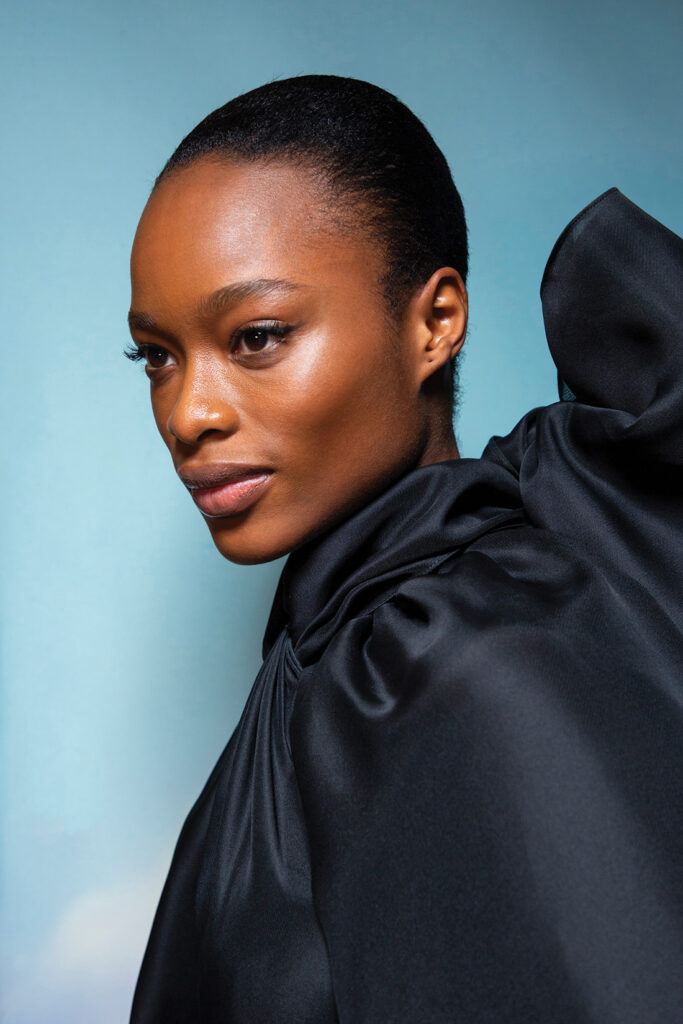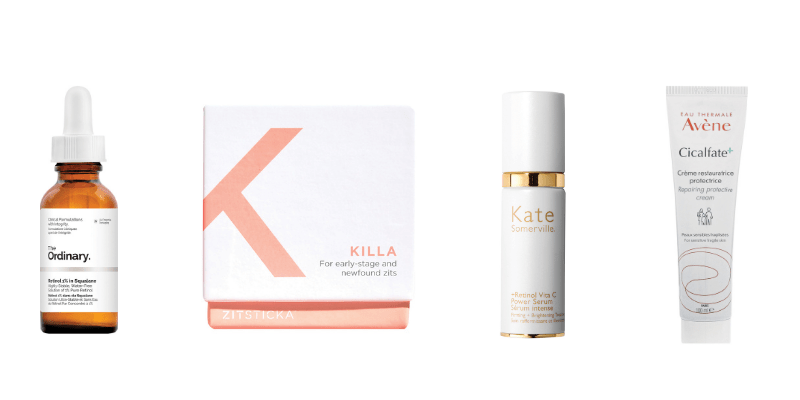Have you tried the feel-good skincare method that puts you in charge of your epidermis health? Now’s the time.
In 2021, the beauty industry is set to shift and evolve once more, becoming more tech-savvy, transparent, and bespoke than ever. Nothing is more personalised than the concept of intuitive skincare: taking a slow, thoughtful approach to caring for your skin’s individual needs by abandoning skincare protocols and instead allowing your intuition to lead the charge. Stepping away from the narrow parameters of a strict regime, now is the time to organically cherry-pick your products based on how your skin is feeling and behaving. This may not seem life-altering, but this kind of intuitive beauty – where products are in loose rotation rather than lined up single-file awaiting their twice-daily turn on the skin – is the new direction in skincare.
So, what exactly is intuitive skincare? You are the only expert on your skin. Only you know how your skin feels. As you slow down and take time to listen, you will start to question things and ask yourself what really feels good; what makes your skin react in a positive way; does your skin really look soft and nourished? Dermatologist Dr Shaaira Nasir likens this level of perceptiveness to intuitive eating, a non-diet diet based on moderation where you eat what you want when you want, with a “goal of satisfaction, not excess.” With this strategy, stepping away from a rigid diet is key and can similarly be applied to your skincare. “It is about understanding how your skin behaves so you can react appropriately with the best products for the job,” says Dr Nasir. By tapping into your own instincts, you can listen to the needs of your skin and assess which factors – such as stress, diet, exercise, or hormones – may have contributed to its current mood, making changes to support your altering needs.

Intuitive beauty involves daily and weekly self-critique on skin in order to assess which products are improving the skin’s health | Brandon Maxwell AW20
The concept that skin has a type is also something to step away from. Antonia Knox, brand expert at Aurelia – the probiotic skincare brand fusing BioOrganic botanicals with probiotic ingredients to restore, balance and protect the skin from within – sees the benefits of combining products. “I encourage clients to actively assess what their skin needs at certain times of the year, and not to feel restricted by one skin-type, which might not necessarily cover all bases.” The truth is that glowing, happy skin is the result of a whole-body system. Learning to trust your inner voice is an empowering way to take control of the results you can achieve. This can be challenging, and for most people there is a lot to unlearn before you can trust your own instincts, since we are used to treating symptoms, rather than the root cause. What’s more, adopting an intuitive approach to beauty could eliminate product dependency. “You never want to feel like your skin is going to breakdown if you skip a particular product for a day,” says dermatologist Dr Zainab Laftah. “Our bodies go through fluctuations all the time, due to weather, diet, or for anyone who menstruates, a monthly cycle. Intuitive beauty is about figuring out how those factors impact the skin and then how you can fill in the blanks with products.”
Skincare issues including acne, rashes, inflammation, and signs of premature ageing are on the rise, and finding something to help can be an endless cycle. Often, we look to products we know are unhealthy to give some relief, but ultimately, they are just temporary band-aids and not long-term solutions for real healing. Exfoliating is an example of this: it is great and highly recommended when done two to three times a week on the right complexion; however, depending on how sensitive your skin is, you should err on the side of caution – the more sensitive your skin, the more granular and gentler your exfoliant should be. The same goes for over-cleansing – that squeaky-clean finish is leaving your skin feeling tight and has stripped the skin of the natural oils that help maintain hydration. Equally, the trend to layer products should also be approached with care as some ingredients when combined can actually cancel each other out or even cause harmful skin reactions. It is worth understanding how ingredients interact with each other and which can be combined. For example, vitamin C serum and retinol work optimally in different pH environments, so shouldn’t be layered on top of each other. Retinol also shouldn’t be layered with AHAs or BHAs because this combination can cause excessive skin sensitivity, redness and irritation. Also consider the fact that reducing reliance on synthetics that your skin may not really need can help to restore natural hydrating processes, balance pH levels and strengthen the natural protective barrier.
In the wake of chemicals that often do more harm than good, many clean, non-toxic skincare formulas have entered the scene, offering better, more lasting results that are healthier for you, your skin, and the planet, while intuitively taking a slower and more considered approach to caring for your skin’s individual needs. The majority of skincare companies offer a strict protocol to be effective and can overwhelm the user with a complex skincare regime. An intuitive approach, on the other hand, releases you from one-size-fits-all routines and encourages perceptiveness to really get to know what your skin craves, factoring in external causes when navigating changes in your skin to understand what types of ingredients it loves and allowing for change whenever needed. So, for example, if you have a breakout, reach for Zitsticka’s Killa patches, which target deep, under-the-skin pimples. Containing just five ingredients, including hyaluronic acid, salicylic acid, and niacinamide, blemishes are treated at the source. If you’ve just spent a weekend in the glaring sun, Eau Thermale Avène Cicalfate+ Restorative Protective Cream will soothe sunburn thanks to ingredients sucralfate and zinc oxide, which form a barrier on top of skin to provide further irritation and activate the skin’s microbiome to heal damaged skin.

Retinol by The Ordinary, Zitsticka by Killa, Retinol Vita C Power Serum by Kate Somerville and Restorative Protective cream by Eau Thermale Avène are all touted as clean and artificial-chemical free solutions that could set the foundations for good skincare
But most importantly, once your skin is healed of its temporary ailments, you can place the products at the back of the cupboard again. Nothing is one-size fits all, especially skin, so everyone should work on a bespoke combination of products. This perspective is championed by Sarah Chapman, sought-after celebrity facialist and founder of her eponymous results-driven skincare range. “Everyone’s skin is unique, and I’ve always taken this approach in my Skinesis Clinic – a Skinesis facial is rarely the same twice. Your skin changes constantly due to lifestyle, environment, hormones, the products you use, diet, climate, and more, so it’s hugely important to adapt your skincare accordingly.”
If anyone is qualified to speak with authority on topical skincare, it’s Dr Anita Sturnham. Her CV includes 15 years as a GP specialising in dermatology and aesthetics, and now she’s condensed those decades of knowledge into Decree, a concise, highly effective brand that cuts through the noise to make the feat of healthy, balanced skin an easier to achieve. Sturnham certainly believes in a bespoke and personalised approach, but suggests that while taking this direction it is important to keep the core active ingredients consistent. Being intuitive isn’t about overloading your regime with too many products, and rotating products also needs to be done with care, since many skin issues can be worsened by changing products too frequently. “Skin actually prefers consistency and routine. The only thing you need to change daily and be in tune with is the very top layer product, your moisturiser. Owning a light and rich textured product and switching in an out according to your skin’s needs on the day is an approach I recommend,” says Dr Sturnham.
The key to this intuitive approach is not having a bathroom cabinet bursting full of products for every eventuality. Just a few smart choices that can be interchanged within a stable routine will help you work towards the strong and balanced skin that we’re all striving for. How is your microbiome supposed to reach optimum levels of beneficial bacteria, the very microorganisms that will keep your skin balanced, if you keep handicapping it with stripping products? So, avoid getting tempted by all the products that promise to fix your skin issues, and instead look at your skin as a result of a combination of mindful tweaks. Knox believes that together with an intuitive approach being fundamental, taking care when deciding what products and ingredients to use is equally as important. “Being in touch with your skin’s phases, whether seasonal or even weekly, is paramount to ensuring that the routine you’re using can work effectively. Get to know your skin, and care for it sensitively, with products and ingredients that aren’t going to drastically change its natural balance.” “Your skin might feel dry and dehydrated one week, but oily and prone to blemishes the next. Similarly, the seasons can affect your skin, with pigmentation issues more common in the summer months, while the winter can cause problems with the skin’s barrier, leading to redness and sensitivity. With this in mind, you should be prepared to accommodate the subtle changes in your skin from week to week,” shares Chapman.
When looking for the products that will build up your new regime, it is helpful to have SOS products on standby to work in synergy alongside your core regime for those moments when your skin needs an extra helping hand. “On days where you have pesky breakouts, a salicyclic acid or benzoyl peroxide product can be used to spot-treat problem areas, and after a long day in the sun you may require a hydration pick-me-up, making a hydrating mask a great SOS extra to add into your night-time skincare routine that day,” Sturnham says.
Ultimately, intuitive skincare is a way to make sure your skincare needs are being met. “We customise everything in our life, from our style to our diet, and the same should be applied to skincare. Once you learn how to read the signs, just giving your skin what it needs makes taking care of it easier,” says dermatologist Dr Justine Kluk. It’s a personal process of honouring your skin by listening and responding to the direct messages it’s sending you. What separates intuitive skincare from traditional skincare is that it is 100 percent flexible, it can and will look different for everyone. No one needs the exact same formulas every day because no two days are exactly the same.
Read Next: The Golden Rules For Sun Protection
- Words by Eliza Scarborough





